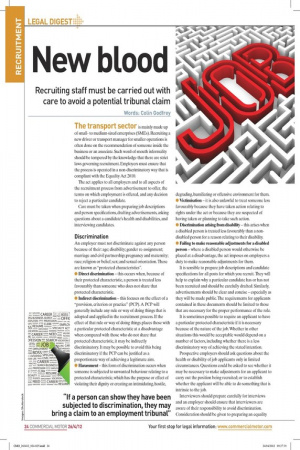New blood
Page 17

If you've noticed an error in this article please click here to report it so we can fix it.
Recruiting staff must be carried out with care to avoid a potential tribunal claim
Words: Colin Godfrey The transport sector is mainly made up of smallto medium-sized enterprises (SMEs). Recruiting a new driver or transport manager for smaller operations is often done on the recommendation of someone inside the business or an associate. Such word-of-mouth informality should be tempered by the knowledge that there are strict laws governing recruitment. Employers must ensure that the process is operated in a non-discriminatory way that is compliant with the Equality Act 2010.
The act applies to all employers and to all aspects of the recruitment process from advertisement to offer, the terms on which employment is offered, and any decision to reject a particular candidate.
Care must be taken when preparing job descriptions and person specifications, drafting advertisements, asking questions about a candidate’s health and disabilities, and interviewing candidates.
Discrimination
An employer must not discriminate against any person because of their: age; disability; gender re-assignment; marriage and civil partnership; pregnancy and maternity; race; religion or belief; sex; and sexual orientation. These are known as “protected characteristics”.
• Direct discrimination – this occurs when, because of their protected characteristic, a person is treated less favourably than someone who does not share that protected characteristic.
• Indirect discrimination – this focuses on the effect of a “provision, criterion or practice” (PCP). A PCP will generally include any rule or way of doing things that is adopted and applied in the recruitment process. If the effect of that rule or way of doing things places those with a particular protected characteristic at a disadvantage when compared with those who do not share that protected characteristic, it may be indirectly discriminatory. It may be possible to avoid this being discriminatory if the PCP can be justified as a proportionate way of achieving a legitimate aim.
• Harassment – this form of discrimination occurs when someone is subjected to unwanted behaviour relating to a protected characteristic, which has the purpose or effect of violating their dignity or creating an intimidating, hostile, degrading, humiliating or offensive environment for them.
• Victimisation – it is also unlawful to treat someone less favourably because they have taken action relating to rights under the act or because they are suspected of having taken or planning to take such action.
• Discrimination arising from disability – this arises when a disabled person is treated less favourably than a nondisabled person for a reason relating to their disability.
• Failing to make reasonable adjustments for a disabled person – where a disabled person would otherwise be placed at a disadvantage, the act imposes on employers a duty to make reasonable adjustments for them.
It is sensible to prepare job descriptions and candidate specifications for all posts for which you recruit. They will help to explain why a particular candidate has or has not been recruited and should be carefully drafted. Similarly, advertisements should be clear and concise – especially as they will be made public. The requirements for applicants contained in these documents should be limited to those that are necessary for the proper performance of the role.
It is sometimes possible to require an applicant to have a particular protected characteristic if it is necessary because of the nature of the job. Whether in other situations this would be acceptable would depend on a number of factors, including whether there is a less discriminatory way of achieving the stated intention.
Prospective employers should ask questions about the health or disability of job applicants only in limited circumstances. Questions could be asked to see whether it may be necessary to make adjustments for an applicant to carry out the position being recruited; or to establish whether the applicant will be able to do something that is intrinsic to the job.
Interviewers should prepare carefully for interviews and an employer should ensure that interviewers are aware of their responsibility to avoid discrimination. Consideration should be given to preparing an equality











































